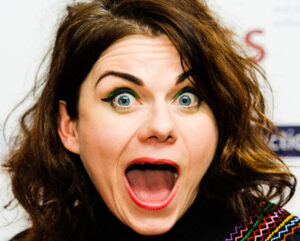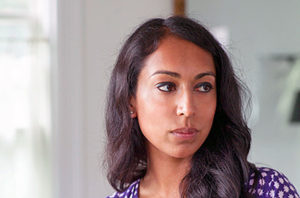If you’re a politician, the presence of a global LGBT+ activist movement offers large amounts of political bang for your buck, pound or euro — whether that’s by waving trans flags enthusiastically, or by banning books about gay dads. Last year, a senior spokesman for the Brothers of Italy Party sent a strong message to core voters with relatively little effort by demanding the censoring of an episode of Peppa Pig. The episode in question featured the Right’s worst nightmare: co-parenting lesbian polar bears. Since then, the Party has become the majority partner in the Italian coalition government. This week, we discovered that it’s now turning up the heat for lesbian humans, too.
Under leader Giorgia Meloni, it has been decided that only the name of the biological mother within a lesbian couple may appear on their child’s birth certificate, reversing the previous decision of certain Italian municipalities to include both partners. Some town halls are stripping existing parental rights from lesbian partners retrospectively. The grand total of couples involved is said to be 33 — a perfect number, when you want to send a shot across the bows without hitting too many voters along the way.
Luca Ciriani, the minister for parliamentary relations, insisted last month: “In Italy, marriage is only between a man and a woman, and therefore only the biological parent is the parent whose surname can be registered.” (Civil unions, but not marriages, have been around for same-sex-attracted people in Italy since 2016.) Given the international climate, it’s predictable that her party would go in this direction. What is perhaps less predictable, given the heavy presence of lesbians and atheists among them, is that the move has also gone down well with some in the UK fighting for women’s rights.
Tired of the erasure of biological motherhood on multiple fronts these days — whether from activists renaming trans-identified fathers as “mothers”, or from surrogacy enthusiasts presenting a birth mother as a fancy kind of packaging from which a beautiful baby can eventually be unboxed — campaigners such as Kellie-Jay Keen (aka Posie Parker) and others have endorsed Meloni’s conclusion. Any concessions to the renaming of biological reality are “the thin end of the wedge”, Keen argues — where the thick end presumably involves schoolgirls believing they are boys, transwomen photographing themselves “breastfeeding”, and other forms of present or future definitional anarchy.
As it happens, I’m named on my youngest child’s birth certificate, though I didn’t give birth to her. My lack of contribution in that respect is made clear by my categorisation as “parent”, while my partner is named, accurately, as “mother”. Such an entry became legally possible in 2009 for lesbians in civil partnerships, bringing parity with what had already been possible for years for heterosexual males, as long as they were in a couple using donor sperm for fertility issues. If there is a wedge here, it started with infertile men being registered as parents of children they did not conceive.
I don’t object at all to the fact of criticism of either practice, and I certainly wouldn’t hurl accusations of homophobia around because of it. Not every objection to the liberalisation of traditional family structures in favour of gay people is homophobic in origin. In an ideal world, I agree, we would each know where — or more specifically, who — we came from, though the world is far from ideal in that respect. According to the Office for National Statistics, in 2021 nearly 5% of birth certificates issued in the UK didn’t record any father at all.
But this isn’t the only point of a birth certificate in any case. The named presence of an adult there also officially gives him or her the set of legal rights and responsibilities associated with being a parent. It is these that have been removed from one half of lesbian co-parenting couples in Italy. In order to be able to do things like pick up a child after school or take over childcare in the event of the birth mother’s death, the excluded partner must now go through a lengthy adoption procedure.
Viewed in this light, naming a second lesbian parent on a child’s birth certificate is a family-friendly move. Arguably, if you squint a bit, it’s even a socially conservative move — though agreeing probably depends on whether you take, as your baseline, a society where lesbians will have children anyway; or whether you think of it as a cultural aberration that could, with discouragement, be stopped. Either way, putting a second lesbian partner on a birth certificate officially defines and legitimises her parenting relation within the family, allowing the burdens and joys to be shared between two adults, and adding a second layer of protection for the child. Family stability is important for good childhood outcomes, and this measure seems to provide some.
Coincidentally, the Marriage (Same Sex Couples) Act was passed in the UK a decade ago this week. With the benefit of hindsight, it is interesting to revisit the associated parliamentary debate of the Bill, as politicians discussed whether lesbians and gays had the right to nervous breakdowns over table settings and canapé choices like everybody else.
Much of the progressive case for same-sex marriage centred on the notion that the game of marriage — its pleasures and its wider benefits — did not require the pieces on the board to have any particular shape. As Yvette Cooper declared at the time: “We all love the idea of a wedding, we all support the idea of a strong marriage and, clearly, we all like a good party.” The conservative case, meanwhile, focused on sexual difference as the essential basis of a Christian marriage, specifically for the purposes of bringing up children. Yet it seems to me that, as is often the case, both sides overstated things.
Back then, progressives tended to follow the lead of LGB activists in avoiding all discussions of how lesbian or gay partnerships might meaningfully differ from the heterosexual versions. There was a similar code of silence over how lesbian relationships might differ from the gay male kind — bizarrely, since in many ways a female-female couple is the opposite of a male-male one. The general conceit, for the purposes of equality narratives, was (and still is) that any differences — either with heterosexual couples, or with homosexual couples of the opposite sex — are superficial, and that we are all the same really.
Any diversion from this approved line tended to result in immediate cries of homophobia, and still does. It’s a shame, for — as well as having presented a suffocatingly authoritarian blueprint for future transactivists to follow — this strategy has also been counterproductive for child development. Specifically, it has removed any possibility of having constructive, non-judgemental public discussions about how the needs of same-sex parents and their offspring might somewhat differ from those in heterosexual contexts.
For instance, children growing up in lesbian households ideally need strong emotional connections with adult males as well, whether via family or friends, while kids growing up with gay male parents also need positive relationships with women. This is not something that many progressives are prepared to talk about. Also hard to acknowledge — but still true — is that, like straight male counterparts, gay male parents are on average less likely than females to feel confident in caring for young children. A society that could mention these things easily could also offer more support for those that require it.
It would also be good to freely discuss the potential costs of unknown paternity or maternity for children generally, without getting worried about the sensitivities of gays and lesbians in particular. Relatedly, the gay male use of surrogates is an ethical minefield. It requires an open discussion without kneejerk accusations of bigotry.
Progressives have often steered clear of such points because they fear that a slippery slope is invited towards the conclusion that gay people shouldn’t have children at all — a point on which many Christian contributors to the 2013 parliamentary debate doubtless would agree. But most constituents these days are not practising Christians; and even those who are, are usually pretty liberal. Shorn of a religious framework insisting that, by definition, both a marriage and a family must contain one man and one woman, any ensuing draconian policy implications would be unattractive to most. We aren’t in Catholic Italy.
Recently, I’ve been glued to a Netflix reality show called The Ultimatum, where couples swap partners for three weeks, ostensibly in order to assess whether they are ready for marriage in their own couple. It’s a genius idea that could only attract deliciously watchable dysfunctionality, a promise on which it totally delivers. There’s a lesbian version and a straight version — and it’s fascinating to inspect each series with an eye to differences and similarities.
Yes, lesbians seem to cry more (but only just); and yes, heterosexuals seem to have more sex (but only just); but even so, watching the two series consecutively also reveals the deep similarities between humans looking for lasting love. (Indeed, after watching the first one, only featuring females, I struggled not to read the men in the second as particularly successful butch lesbians.)
If it’s a basic aim of society to produce well-adjusted, happy children in the context of stable, long-lasting romantic relationships — and a lot of evidence suggests it should be — then it would be a wasted opportunity not to offer lesbian and gay couples policy tools that help them contribute to this process. We don’t have to choose between traditional complementarity narratives about marriage or parenting, and a structureless free-for-all in which any permutation is permitted in order to prop up fantasies of exact sameness. Paying attention to real differences between sexual orientations should not preclude keeping our eye on the bigger picture — nor vice versa.
Disclaimer
Some of the posts we share are controversial and we do not necessarily agree with them in the whole extend. Sometimes we agree with the content or part of it but we do not agree with the narration or language. Nevertheless we find them somehow interesting, valuable and/or informative or we share them, because we strongly believe in freedom of speech, free press and journalism. We strongly encourage you to have a critical approach to all the content, do your own research and analysis to build your own opinion.
We would be glad to have your feedback.
Source: UnHerd Read the original article here: https://unherd.com/




